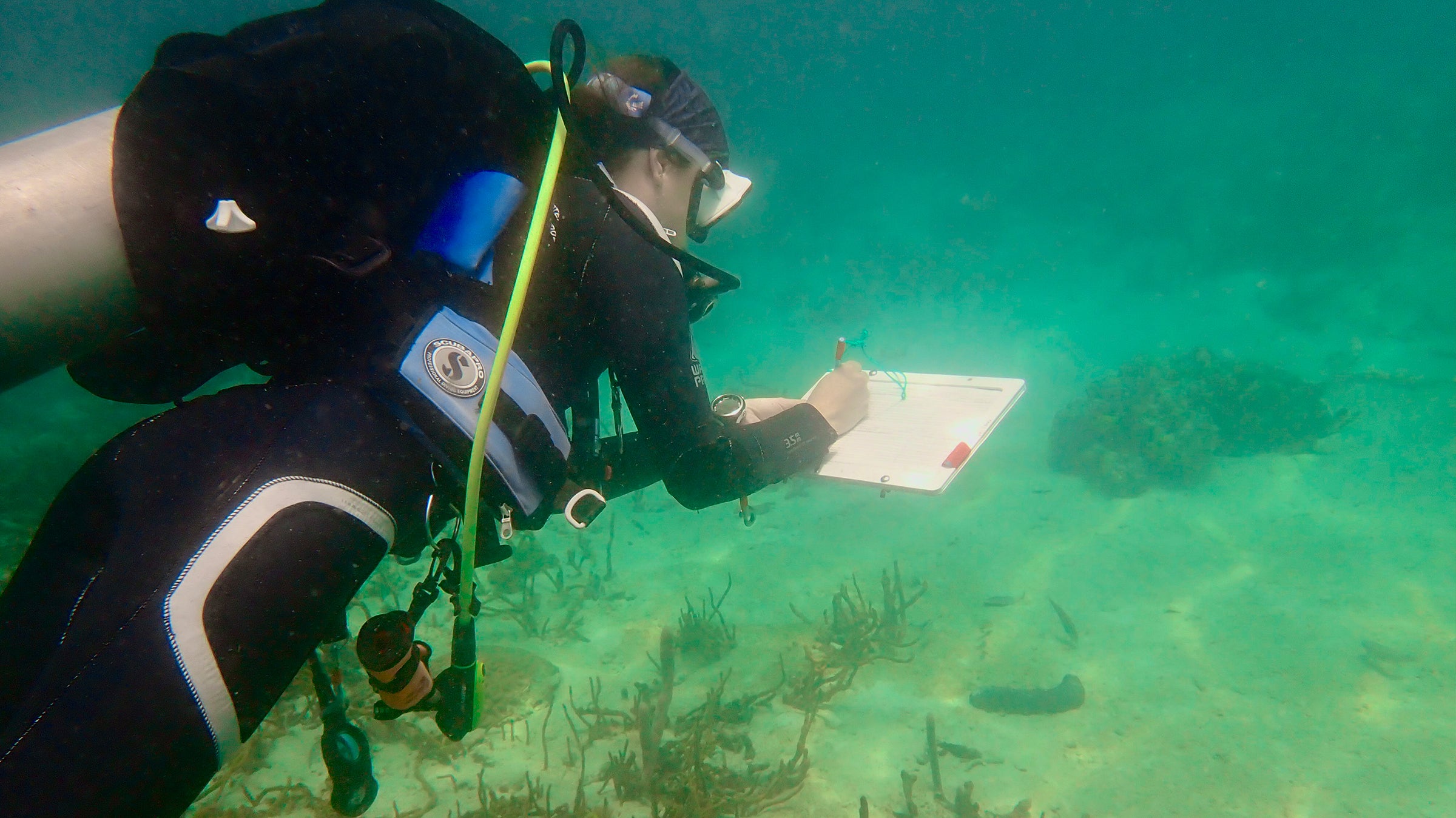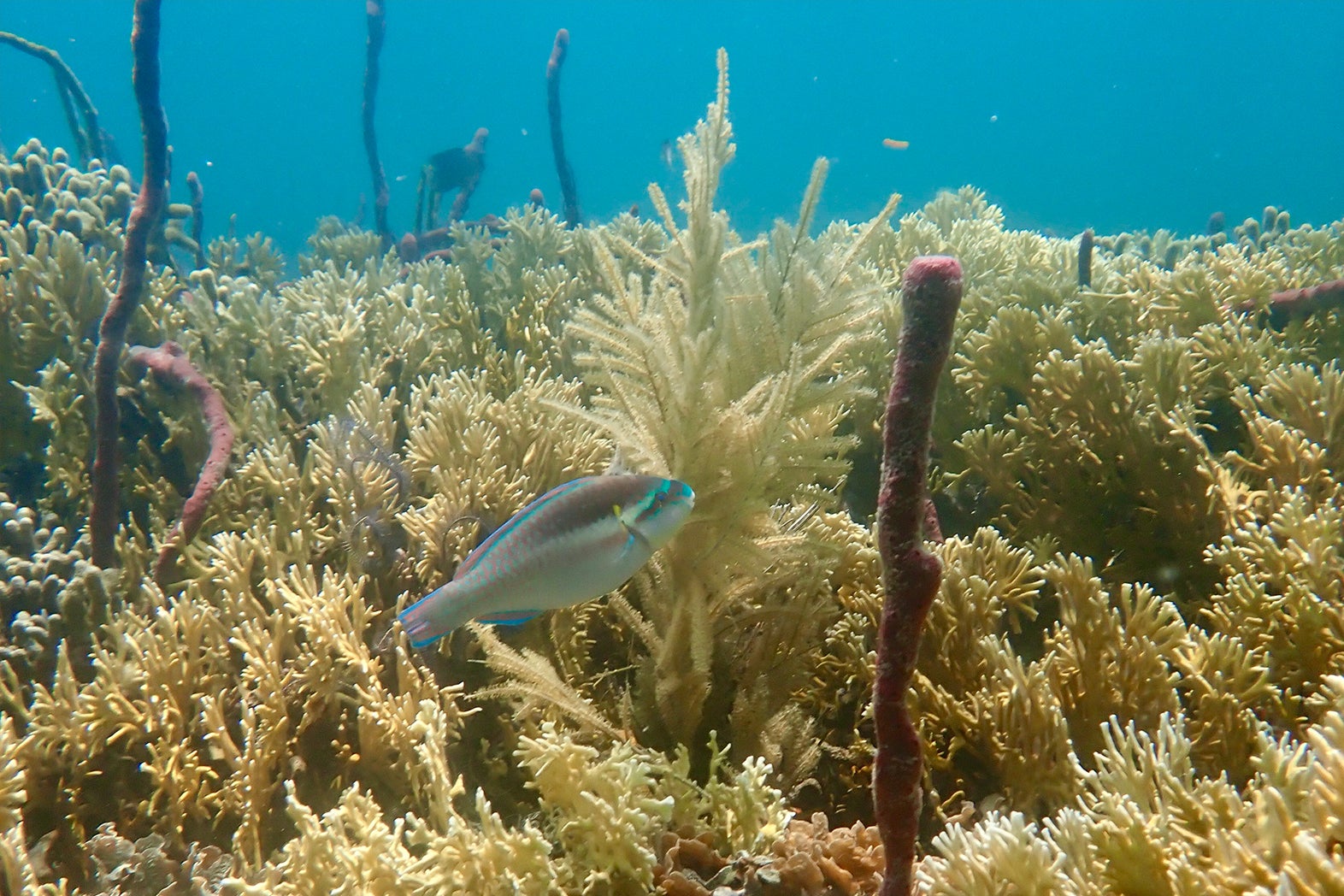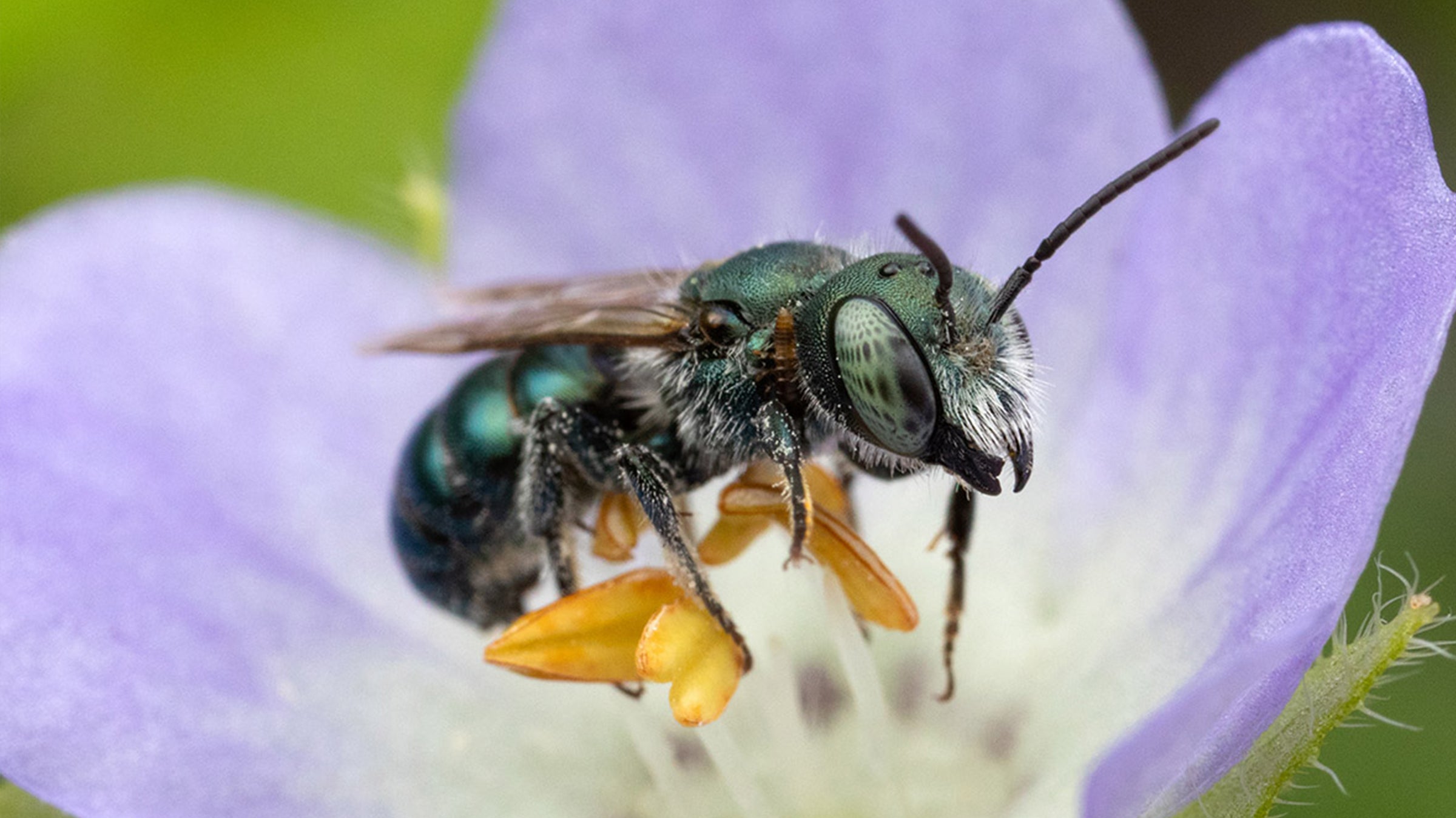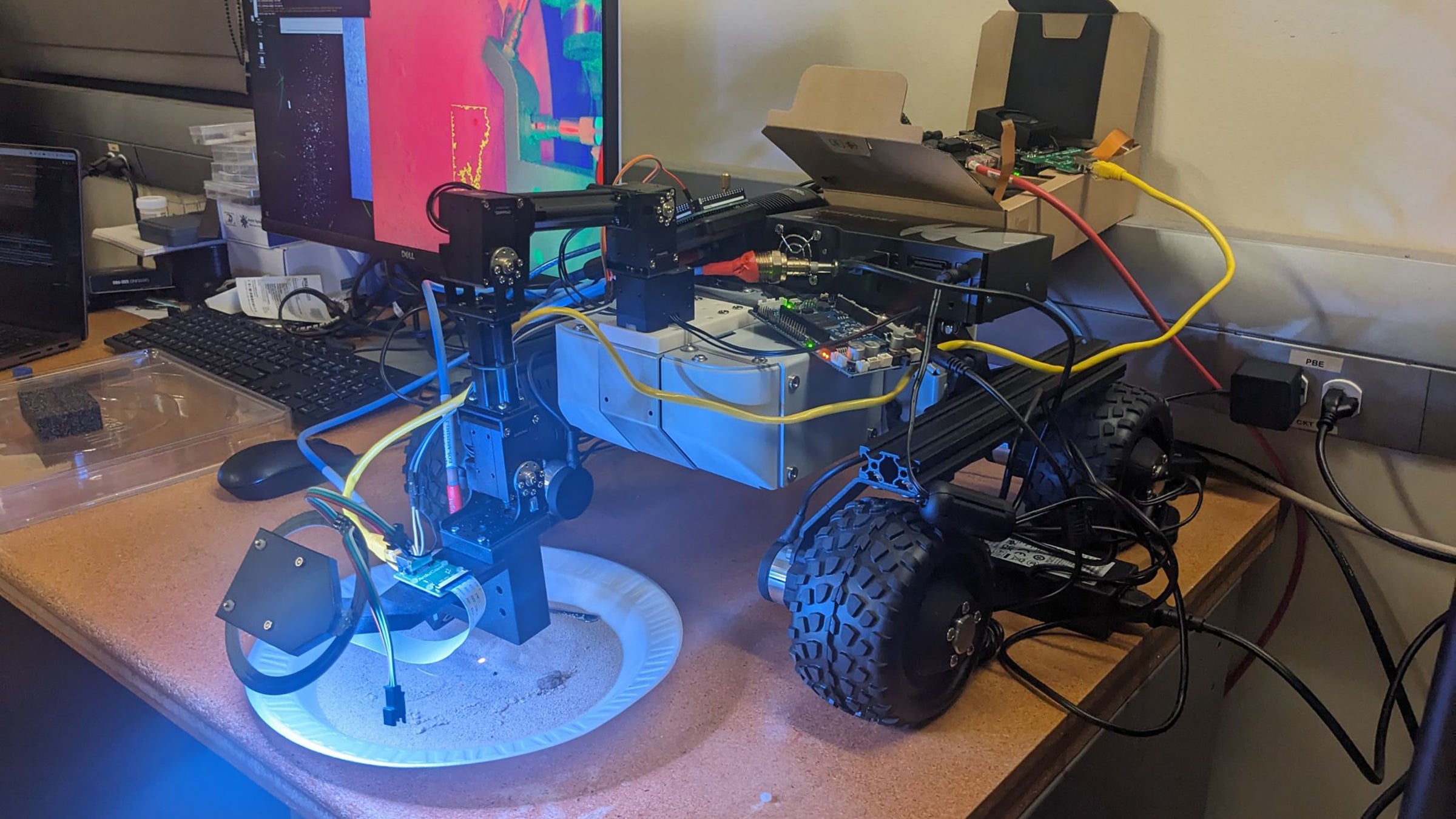
Hannah recording fish behavior. (Photo by Andrés Moreno González)
Tell us where you came from before UT and what you studied then?
I got my Master’s in Biological Sciences at California Polytechnic State University, San Luis Obispo, where I studied parrotfish-coral interactions. Parrotfishes are named for their bright colors and beak-like front teeth. They are not only important fisheries in many parts of the world but are also widely believed to play critical roles in keeping maintaining abundant coral populations by grazing algae and cyanobacteria that can overgrow and smother corals if left unchecked. However, some species also occasionally feed on live corals. My Master’s research focused how changes in the abundance of parrotfishes and coral species influence the intensity of parrotfish predation on corals and factors influencing coral healing from these bites. I also studied their roles in eating fish feces, a behavior called coprophagy that may be an important source of nutrient cycling on nutrient-limited coral reefs! In my PhD, I’ve continued studying the diverse ecological roles of parrotfishes and some other similar species.
What got you interested in studying coral reef fish?
I grew up on the Washington coast crabbing and clamming with my grandparents, and a series of pollution-related shellfish closures in high school first sparked my interest in marine conservation. During college, I had the opportunity to study abroad on the Caribbean Island of Bonaire, where I conducted an independent project on how the foraging behavior of parrotfishes. After earning my B.A., I worked as an Assistant Biologist for the Bonaire National Parks Foundation on a variety of projects ranging from mangrove restoration with local fisherman, monitoring endangered shorebird nesting success, and surveying coral bleaching with other scientists and community volunteers. Through these experiences, I realized I wanted to pursue a career conducting marine ecological research on how we can more effectively manage marine species to balance immediate fishing and recreation needs with long-term ecosystem conservation.

Hannah Rempel and fellow lab member/grad student Juan Pablo Lozano Peña conduct lab work to analyze biochemical tracers of fish diets using a technique called Compound Specific Stable Isotope Analysis. (Photo by Jonathan Cybulski)
Does Texas present a unique situation, challenge or benefit for your research?
UT Austin has provided a tremendous amount of support for my research, for which I am incredibly grateful. Throughout my time at UT, I have built collaborations with top-tier researchers, had access to a variety of molecular and isotopic laboratory facilities for my research, become part of a wonderfully supportive graduate and postdoc community, and had opportunities to travel both to conduct my research and share it with others. This support has enabled me to expand the scope of my research, integrate multidisciplinary and novel techniques I would otherwise not have the training and facilities to implement, and be part of a truly exceptional learning community.
What does the Marine Science Institute (MSI) offer for your research?
The Marine Science Institute has provided me a unique opportunity to conduct research spanning from Texas estuaries to coral reefs in Panama. My PhD research is focused on how the ecosystem roles of fishes that feed on algae, cyanobacteria, and detritus may shift in response to human impacts in both coral reefs and Gulf Coast estuaries. My work integrates traditional fish foraging surveys with cutting-edge laboratory techniques including DNA metabarcoding. DNA metabarcoding is a technique that uses trace DNA left behind in water or an organism’s gut tract to survey biodiversity and species’ diets. Part of my Texas-based research is focused on developing consistent methods and identifying best practices in using DNA metabarcoding to study the diverse diets of omnivorous fishes. Additionally, I am employing this technique to study the diets of several abundant yet understudied cryptic fishes that may be important food sources for iconic Texas fisheries and support our vibrant coastal ecosystems. The Marine Science Institutes facilities and access to research sites less than three minutes from the lab where I work have provided wonderful opportunity to conduct research that would not be feasible elsewhere.

A Striped parrotfish (Scarus iseri) swims along a reef in Bocas del Toro Panama.
How will being a Stengl-Wyer Fellow help advance your work?
The Stengl-Wyer Fellowship has afforded me the opportunity to focus on producing and sharing high-impact research as I finalize lab work and begin writing my dissertation. My PhD research integrates traditional fish foraging surveys with cutting-edge molecular and isotopic techniques to evaluate species-specific foraging and nutritional roles of coral reef and estuarine fishes. Additionally, I am assessing how their foraging targets shift on more degraded reefs and how this may influence their dietary exposure to toxicants. Species-specific ecological data for these critically important fishes can help inform management strategies that balance fishing needs with long-term reef resilience. During the fellowship year thus far, I have finished the last of my lab research, presented findings at a national fisheries conference, begun writing the first manuscript of my PhD, and continued to collaborate with a former student I worked with in Panama who is now a Laboratory Research Assistant at MSI. I am very grateful for the support and professional development opportunities this fellowship provides!
Where do you see your research agenda heading after UT?
My research interests are in studying how human impacts alter the ecosystem roles of marine organisms and how we can effectively manage species to meet short-term community economic needs while also preserving healthy marine ecosystems for future generations. While I am still debating working in academia as I have loved teaching and mentoring students, I am particularly drawn to a career as a marine biology researcher at an agency such as the National Oceanic & Atmospheric Association. I aim to apply skills in molecular and isotopic ecology I have developed in my PhD to advance our understanding of the ecosystem and economic roles of key fisheries. What excited me about this career path is the ability to conduct research addressing urgent conservation challenges and having it inform policy and management actions to help preserve marine biodiversity and ecosystem services.



